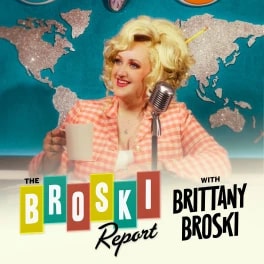

This article is an excerpt from the Shortform guide to "The Broski Report with Brittany Broski". Shortform has the world's best summaries and analyses of books, podcasts, and more.
Like this article? Sign up for a free trial here.
Why is self-esteem for women so hard to achieve? What are ways Brittany Broski boosts her self-confidence?
In an episode of The Broski Report, Brittany Broski discusses the struggle to feel positive about one’s body. Whether they realize it or not, women are faced with an internal conflict of identity that stems from their perception of their bodies and seeking male approval.
Keep reading to learn how Broski started gaining her confidence back.
Navigating Self-Esteem and Male Validation
One popular internet personality who has gained attention for her comedic podcasts is Brittany Broski. Known for her presence on platforms like TikTok and YouTube, Broski uses humor as a means to discuss serious topics related to self-esteem for women and personal growth. Self-esteem plays a crucial role in how individuals perceive themselves; seeking validation from others can be particularly influential for some people. Male validation refers to seeking approval or recognition from men as a way to boost self-esteem or feel validated.
Broski kicks off her episode with a playful reference to “The Cunty Diaries” and uses a specific Beyoncé song to emotionally convey her struggles with the desire for male approval.
Incorporating vivid anecdotes from her life, including an amusing therapeutic Beyoncé karaoke session, she humorously shares her internal dialogue critiquing her physique and romantic aspirations.
She adeptly adds a facetious twist to serious matters, exemplified by her karaoke sessions and musings on acceptance versus validation.
Body Positivity and Self-Acceptance
Continuing her candid trajectory, Broski humorously critiques her physical qualities through the imaginative lens of a satirical courtroom drama, treating her allure as key evidence.
She also shares a whimsical daydream involving a trivial domestic mix-up with Irish musician Hozier, which portrays her romantic aspirations in a playful, endearing manner.
Tackling the intricacies of body image, she likens herself to well-known drag queens, capturing the varying degrees of self-perception experienced during a night out. Broski candidly discusses the reality of having a larger bust, dispelling the perceived glamor with humor and sarcasm, while championing self-acceptance.
Personal Growth Through Therapy
Broski opens up about more vulnerable aspects of her life by sharing her experiences in therapy. She publicly navigates the nuances of finding the right therapist, openly discussing her reason for discontinuing sessions with a therapist who did not challenge her sufficiently.
She emphasizes her preference for a more straightforward and disciplinary approach to therapy, highlighting the importance of a therapist who can push her toward personal development.
Context
Body image, the perception and evaluation of one’s own body, is a complex concept influenced by various factors such as societal ideals and personal experiences. In today’s digital age, where social media plays a significant role in our lives, individuals of all ages are emotionally and mentally affected by the appearance and body size/shape standards set by society. This has led to an increase in body shaming, which involves mocking or making critical comments about a person’s physical appearance. The consequences of negative body image can be severe, including low self-esteem, eating disorders, isolation, and mental illnesses.
In response to societal beauty standards that often promote unrealistic ideals of attractiveness, the body positivity movement has emerged. This movement aims to challenge these standards by promoting acceptance and appreciation of all body types.

———End of Preview———
Like what you just read? Read the rest of the world's best guides to The Broski Report with Brittany Broski" at Shortform.
Here's what you'll find in our full The Broski Report with Brittany Broski episode summaries:
- Parodies of news programs
- A humorous look at serious topics
- Succinct information about what was covered without losing the entertainment value






